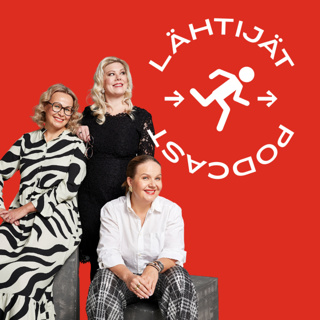
a16z Podcast: Incenting Innovation Inside, Loonshots to Moonshots
with Safi Bahcall (@safibahcall), Vijay Pande (@vijaypande), and Sonal Chokshi (@smc90) A "moonshot" is a destination (like going to the moon, quite literally) -- but nurturing "loonshots" (which often involves a number of stumbles along the way) is how we get there. This goes beyond the trite mantra of failing fast! It is about not having "false fails" or not killing the seemingly small ideas that could lead to outsized yet unexpected outcomes, observes Safi Bahcall (physicist, ex-startup founder, and CEO of a public biotech company), author of the new book, Loonshots: How to Nurture the Crazy Ideas That Win Wars, Cure Diseases, and Transform Industries.So in this episode of the a16z Podcast -- in conversation with a16z bio general partner Vijay Pande and Sonal Chokshi -- Bahcall shares why concepts like "disruptive innovation" cause him gas; why doing market projections can sometimes be crap; and why most management books that focus on culture are b.s.Because CEOs and culture, argues Bahcall, do not control organizational behavior... but hidden incentives, "phase transitions", and specific control parameters do. So how can organizations -- of any size, big or small -- be in two states at the same time: both fluid and stable, soft and solid, with high entropy yet bound energy, and both artists and soldiers? The answer may be in a more scientific, less "squishy" framework for management at the intersection of physics and economics. Big empires always miss the small but important new ideas... can this be why?
25 Maalis 201947min

a16z Podcast: For the Billions of Creatives Out There
with Brian Koppelman (@briankoppelman), Marc Andreessen (@pmarca), and Sonal Chokshi (@smc90) The writer-showrunner is a relatively new phenomenon in TV, as opposed to film, which is still a director-driven enterprise. But what does it mean, as both a creative and a leader, to “showrun” something, whether a TV show… or a startup? Turns out, there are a lot of parallels with the rise of the showrunner and the rise of founder-CEOs, all working (or partnering) within legacy systems. But in the day to day details, really “owning” and showunning something — while also having others participate in it and help bring it to life — involves doing the work, both inside and out. This special, almost-crossover episode of the a16z Podcast features Billions co-showrunner Brian Koppelman — who also co-wrote movies such as Rounders and Ocean’s 13 with his longtime creative partner David Levien — in conversation with Marc Andreessen (and Sonal Chokshi). The discussion covers everything from managing up — when it comes to executives or investors sharing their “notes” aka “feedback” on your work — to managing down, with one’s team; to managing one’s partners (or co-founders)… and especially managing yourself. How to tame those irrational emotions, that ego? Ultimately, though, it’s all about unlocking creativity, whether in writing, coding, or other art forms. Because something surprising happened: Instead of TV going the way of music à la Napster with the advent of the internet, we’re seeing the exact opposite — a new era of “visual literature”, a “Golden Age” of television and art. Are artists apprenticing from other artists virtually, learning and figuring out the craft (with some help from the internet, mobile, TV)? And if we really are seeing “the creative explosion of all time”, what does it take to explode our own creativity in our work, to better run the shows of our lives? All this and more in this episode of the a16z Podcast… as well as some Billions behind-the-scenes (and light spoilers, alerted within!) towards the end.
16 Maalis 20191h 6min

a16z Podcast: Lessons Learned from Chinese Education Startups
When people talk about trends in education technology, they often focus on how to disrupt higher education in the U.S., whether it's about breaking free of the "signaling" factor of elite educations or how to shift education out of its "cottage industry" mindset to achieve greater scale. However, in China, the transformation of education is already well underway, with a fast-growing ecosystem built around lifelong learning. In fact, one of the largest demographic groups paying for education in China is actually not college students -- it's college graduates, aged 26 through 35.In this episode -- which originally aired as a video on our YouTube channel -- a16z general partner Connie Chan talks with operating partner Frank Chen about the lifelong learning ecosystem in China; what it means for startups there; and lessons for entrepreneurs everywhere... or will these techniques even work outside of China?
12 Maalis 201931min

a16z Podcast: What's in the Water at the George Church Lab?
with George Church (@geochurch) and Jorge Conde (@JorgeCondeBio) Renowned scientist George Church is known for his groundbreaking work and methods used for the first genome sequence, and for his work in genome editing, writing & recoding -- in fact, Church’s innovations have become an essential building block for most of the DNA sequencing methods and companies we see today. In this conversation, a16z bio general partner Jorge Conde -- who also founded a company with Church out of the George Church Lab -- take us on a wild journey into the scientist’s mind and work, starting with what the leading pioneer in the space makes of where we are today with CRISPR (especially given recent news about CRISPR babies in China), to the broader implications of all of this on a cultural level, and finally to what it really takes to go from science fiction, to lab, to reality.
26 Helmi 201940min

a16z Podcast: Capitalizing on an Autonomous Vehicle Future
with Peter Ludwig, Qasar Younis (@qasar), and Sonal Chokshi (@smc90) When people talk about autonomous vehicles, we hear everything from "we're much closer than you think" to "we're much further than you think". So where are we, really, in the widespread reality of autonomous vehicles today? It depends, of course, on how you define autonomy -- which is where a handy recap and update of the SAE (Society of Automotive Engineers) levels of autonomy comes in. But still, given everything out there from self-driving shuttles to Teslas, it's really hard to tell just where we are and where the nuances of, say, Level 2-plus vs. Level 3 might come in. This episode of the a16z Podcast takes a quick pulse on where we are in the state of autonomy in 2019 when it comes to autonomous cars, shuttles, robots -- basically any "autonomous" and/or "self-driving" vehicle out there -- as well as the analogy of mobile for understanding the space: where it works, where it breaks down. But did even the mobile industry itself really have a clear iPhone "moment"? When did mobile devices that seemed so limited -- or seemed like just "toys" -- suddenly (or not so suddenly) go to an apps layer that we use every single day? How do we build "the rails" and "the trains" at the same time in this case? And perhaps most importantly, where will the spoils of this new wave of innovation go -- to Silicon Valley or Detroit? Or outside the U.S.? Who are the players? How do regulatory -- and quite frankly, nationalistic -- concerns come into play here? And finally, how does one balance the desire to embrace innovation in an open and fast, yet still very thoughtful and safe way? The answers, according to Applied Intuition co-founder and CEO Qasar Younis and CTO Peter Ludwig (in conversation with Sonal Chokshi), have to do with commodities and capitalism, with science and science fiction, with simulation and software as infrastructure, and more... And really, how we define autonomy now, and in the future.
24 Helmi 201948min

a16z Podcast: Gaming Goes Mainstream
Bobby Kotick is the CEO of Activision Blizzard (a merger he engineered); it's one of only two video gaming companies in the Fortune 500, and the largest game network in the world. The company is responsible for some of the most iconic entertainment franchises, including Call of Duty, Candy Crush, Overwatch, and World of Warcraft -- as well as its own professional esports league. So in this episode of the a16z Podcast, Marc Andreessen interviews Kotick on everything from the evolution of video games in the 1980s to gaming trends more broadly. What changes as gaming goes from "just for nerds" to "just for kids" and spreads more broadly into entertainment and cultural phenomena (esports, Fortnite, Pokemon Go, etc.)... both online and offline? The conversation originally took place at our annual innovation a16z Summit in November 2018 -- which features a16z speakers and invited experts from various organizations discussing innovation at companies small and large. You can also see other podcasts and videos from this event here: https://a16z.com/tag/summit-2018/
17 Helmi 201934min

a16z Podcast: Who's Down with CPG, DTC? (And Micro-Brands Too?)
with Ryan Caldbeck (@ryan_caldbeck), Jeff Jordan (@jeff_jordan), and Sonal Chokshi (@smc90) It's clear that all kinds of commerce companies and consumer products have been disrupted -- or enabled -- by tech. Yet for certain categories, like consumer packaged goods (CPG), it seems like tech hasn't changed things very much. How is the rise of so-called "micro-brands" (or emerging brands) playing out here? And, how is it possible that "real" -- different -- innovation isn't really happening in the CPG industry, despite the tremendous legacy of brand, talent, and more in the space? How are CPG companies tackling grocery, which represents the perfect end-capsule and case study of challenges -- and opportunities -- in going from offline to online, from online to offline, and more? As for grocery itself, stores themselves (in the U.S. at least) haven't changed very much due to tech, either... is it a last-mile delivery thing; could we also possibly move to distribution-only centers in the future? Finally, while the holy grail of performance marketing and personalization remains elusive for the industry -- let’s face it, most brands are still guessing in the dark (and forget trying to customize offerings!) -- even going direct-to-consumer (DTC) hasn't been shining as much of a light here as one might expect. Or so argue the guests in this episode of the a16z Podcast, featuring Ryan Caldbeck of CircleUp, along with a16z general general partner Jeff Jordan, in conversation with Sonal Chokshi. Cuz this episode is all about CPG, DTC; micro-brands, yah you know, all kinds of commerce.
16 Helmi 201947min

a16z Podcast: To All the Robots I've Loved Before
with Kate Darling (@grok_) and Hanne Tidnam (@omnivorousread) We already know that we have an innate tendency to anthropomorphize robots. But beyond just projecting human qualities onto them, as we begin to share more and more spaces, social and private, what kind of relationships will we develop with them? And how will those relationships in turn change us? In this Valentine’s Day special, Kate Darling, Researcher at MIT Labs, talks with a16z's Hanne Tidnam all about our emotional relations with robots. From our lighter sides -- affection, love, empathy, and support -- to our darker sides, what will these new kinds of relationships enhance or de-sensitize in us? Why does it matter that we develop these often intense attachments to these machines that range from tool to companion -- and what do these relationships teach us about ourselves, our tendencies and our behaviors? What kinds of models from the past can we look towards to help us navigate the ethics and accountability that come along with these increasingly sophisticated relationships with robots?
14 Helmi 201927min





















